On August 17, 2016, the City of New Orleans Ethics Review Board selected the following new officers.
Chair
 Allen C. Miller, J.D.
Allen C. Miller, J.D.
Board Chair
Partner, New Orleans Office
Phelps Dunbar LLP
Allen Miller practices in the area of commercial litigation. He concentrates his practice in the areas of general business torts; products liability; casualty litigation, banking and lender liability; class-action litigation; bankruptcy litigation; construction litigation and contracts; civil RICO; trade secrets litigation; professional malpractice; and a wide variety of other corporate litigation matters. He has extensive experience in complex commercial matters. Mr. Miller has handled a substantial number of cases from inception through resolution at trial, appeal and alternative dispute resolution where appropriate. His experience includes, without limitation, first chair litigation counsel in numerous bench and jury trials in state and federal court. He is solely responsible for the litigation strategy and handling of cases for several institutional firm clients, and regularly supervises commercial litigation associates and paralegals. His memberships and affiliations include: Louisiana State Bar Association, Minority Involvement Section, New Orleans Bar Association, American Bar Association, National Bar Association, Federal Bar Association (Board of Directors, Eastern District of Louisiana), International Association of Defense Counsel, Louisiana Association of Defense Counsel, Louisiana Association of Defense Counsel Trial Advocacy (Faculty Member, 2006 – Present), and National Institute of Trial Advocacy (Faculty Member, 2004 – Present). He is a “40 Under 40” Award Recipient (National Bar Association) as well as “40 Under 40” Award Recipient by Gambit Weekly. Past community service includes membership on the boards of Odyssey House of Louisiana, Inc., as Vice-President and Executive Committee Board Member, and WRBH Radio for the Blind and Print Handicapped. Mr. Miller is a graduate of Southern University Law Center and Xavier University. Mr. Miller’s term will expire June 30, 2018. He is a nominee of Xavier University.
Vice-Chair
 James A. Brown, J.D.
James A. Brown, J.D.
Board Vice-Chair
Shareholder, New Orleans
Liskow & Lewis
James A. Brown is a shareholder with the New Orleans law firm of Liskow & Lewis, P.L.C., and heads the firm’s Commercial Litigation Section as well as its Professional Liability Practice Group. He also serves as the firm’s General Counsel and formerly served on the Board of Directors. Mr. Brown is a Fellow of the American College of Trial Lawyers and other national professional and honorary organizations. He is the Chair of the American Bar Association Presidential Standing Committee on Lawyers’ Professional Liability. Mr. Brown is an adjunct professor of trial advocacy and torts at the Louisiana State University Law Center and is a member of the New Orleans, Louisiana, and American Bar Associations. He serves as a member of the Advisory Council for the LSU Honors College. Mr. Brown received his B.A. degree, summa cum laude and valedictorian, from Louisiana State University in 1981. He received his J.D. from the LSU Law Center in 1984. He served as Editor-in-Chief of Volume 44 of the Louisiana Law Review and as law clerk to the Honorable Alvin B. Rubin, Circuit Judge, United States Fifth Circuit Court of Appeals, 1984-1985. He and his wife of 35 years, Kelly, have three sons, two daughters-in-law, and three grandchildren. Nominated to the ERB by the University of New Orleans, Mr. Brown’s term will expire June 30, 2019.
Secretary
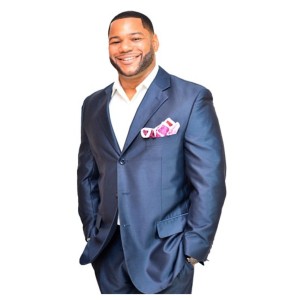 Rev. Brandon Boutin
Rev. Brandon Boutin
Board Secretary
First Pastor & Pastor of Ministries
Greater St. Stephen Full Gospel Baptist Church
Reverend Brandon M. Boutin currently serves as the First Assistant Pastor & Pastor of Ministries at Greater St. Stephen Full Gospel Baptist Church in New Orleans, LA, under the leadership of Dr. Debra B. Morton, and Bishop Paul S. Morton, Sr. Rev. Boutin is a graduate from St. Augustine High School, Xavier University of LA, and New Orleans Baptist Theological Seminary. In 1999, he became a licensed minister and in 2006 was ordained as an elder. Deeply concerned about people, on a daily basis Rev. Boutin may be found in community meetings, on speaking engagements, speaking on college campuses, participating in youth activities, conducting a funeral, wedding, or counseling. Rev. Boutin is a nominee of Dillard University; his term will expire June 30, 2015.


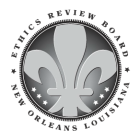
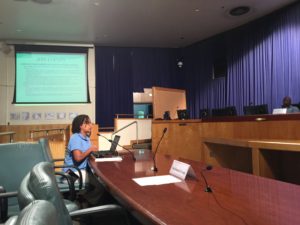
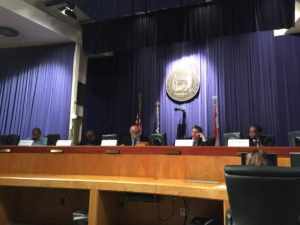 The City of New Orleans Ethics Review Board met on Monday, June 20, 2016, at 4:15 p.m., in New Orleans City Hall, City Council Chambers, 1330 Perdido Street, New Orleans, LA 70112.
The City of New Orleans Ethics Review Board met on Monday, June 20, 2016, at 4:15 p.m., in New Orleans City Hall, City Council Chambers, 1330 Perdido Street, New Orleans, LA 70112.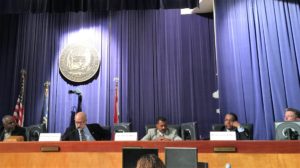 The City of New Orleans Ethics Review Board met on Wednesday, May 25, 2016, at 3:30 p.m., in New Orleans City Hall, City Council Chambers, 1330 Perdido Street, New Orleans, LA 70112.
The City of New Orleans Ethics Review Board met on Wednesday, May 25, 2016, at 3:30 p.m., in New Orleans City Hall, City Council Chambers, 1330 Perdido Street, New Orleans, LA 70112.